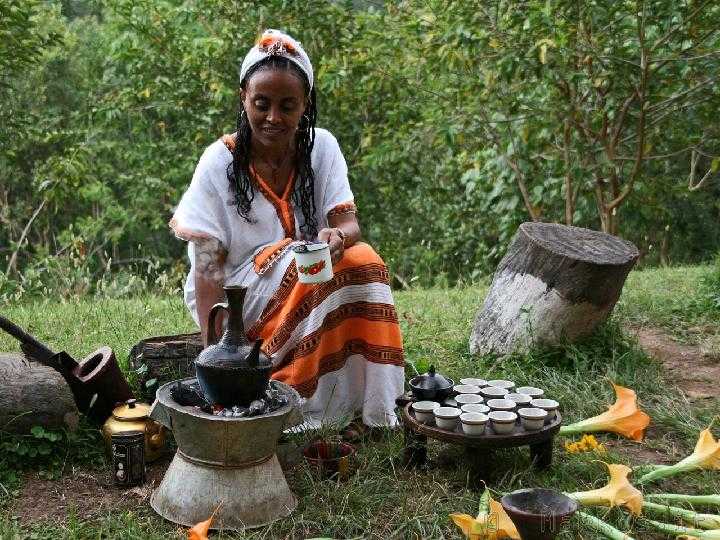ADDIS ABABA, Ethiopia – The coffee community from Africa and around the world gathered in the Ethiopian capital for two days of engaging debate at the 4th World Coffee Conference, hosted by the Government of Ethiopia (in the picture, the Ethiopian coffee ceremony).
Every four to five years, the International Coffee Organization holds a high-level World Coffee Conference to enable discussion around critical topics for the global coffee sector. The first three Conferences took place in London (2001), Brazil (2005) and Guatemala (2010).
The 77 Member Countries of the International Coffee Organization (ICO) and over 900 attendees, including coffee growers and representatives from government, the private sector, and international agencies participated in a range of discussions related to the theme of the Conference, ‘Nurturing coffee culture and diversity’.
His Excellency Mr Hailemariam Desalegn, Prime Minister of Ethiopia, inaugurated the Conference and the First Lady of Ethiopia, Mrs Roman Tesfaye, addressed the audience during a panel on gender equality in the coffee sector.
The Prime Minister was accompanied at the opening ceremony by H.E. Mr Erastus Mwencha, Deputy Chairman of the African Union Commission, H.E. Mr Teferra Derebew, Minister of Agriculture and Natural Resources of Ethiopia, H.E. Mr Wondirad Mandefro, State Minister of Agriculture and Natural Resources of Ethiopia and Chairman of the opening ceremony, H.E. Mrs Chantal Hebberecht, Head of the EU Delegation to Ethiopia, H.E. Mr Iván Romero-Martínez, Chairman of the International Coffee Council and Ambassador of Honduras to the United Kingdom, Mr Fred Kawuma, Secretary-General of the InterAfrican Coffee Organisation (IACO), Mrs Geraldine Fraser-Moleketi, representing the President of the African Development Bank (AfDB) / Special Envoy on Gender (AfDB), and Mr Hussein Agraw, President of the Board of the Ethiopian Coffee Exporters’ Association (ECEA).
Over 20 high-level speakers from around the world participated in debates and discussion around the theme of the Conference with issues ranging from gender equality in the coffee sector to the role of public policy in increasing farm productivity. The complete list of panels, including names of moderators and panelists, can be found at www.coffee2016.com.
Coffee Market Outlook
The Executive Director of the ICO, Mr Robério Oliveira Silva, presented an outlook for the global coffee market to members of the press during the WCC in Ethiopia. ICO’s current estimate for global coffee production in crop year 2015/16 is of 143.4 million 60-kg bags, 1.4% higher than last year.
Lower production in Brazil of 43.2 million bags has been compensated by increases in Vietnam, Colombia and Indonesia, among others. In Africa, production is rising by 6.1% to reach 17.1 million bags, representing nearly 12% of the world total.
In Ethiopia, output is currently estimated at 6.4 million bags, 3.4% less than last year, as the inconsistent rains have had a negative effect on the crop.
Looking ahead to crop year 2016/17, Brazil’s National Food Supply Company (CONAB) have initially estimated production in the country at between 49.1 and 51.9 million bags. This could potentially be a record crop for Brazil, higher than the 50.8 million produced in 2012/13.
Global coffee consumption in calendar year 2015 is estimated at 152.1 million bags, up from 150.3 million in 2014. Total consumption in importing countries is estimated at 104.9 million bags, while exporting countries have increased at an average rate of 2.1% over the last four years to reach 47.3 million bags.
These production and consumption figures suggest that 2015/16 will be another deficit year in the coffee market, with demand exceeding supply. This gap is being filled by buildup in stocks, particularly in exporting countries, in previous years when output was higher.
Coffee prices have stabilized recently, but they remain at very low levels. The average price of the ICO composite indicator price was 111.75 US cents/lb in February, 0.8% higher than the previous month, but down from 141.10 cents a year ago.
This decline in the coffee market over the last 18 months has been mostly attributed to the ongoing depreciation in the Brazilian real against the US dollar, along with a broader weakness in global commodity prices.
Export levels have also remained strong, allowing inventories in importing countries to be well restocked and give roasters a considerable buffer against any short-term supply concerns. This has prevented prices from maintaining any significant rally.


















